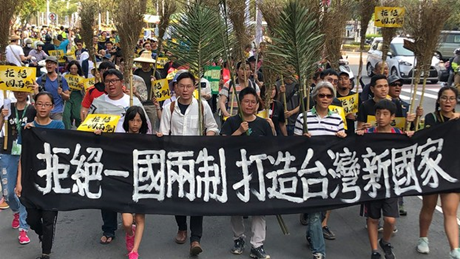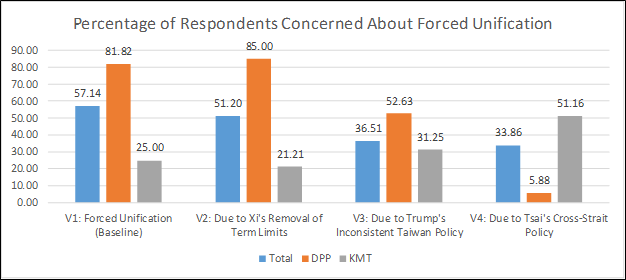
Taiwan Public Opinion Polling Regarding Forced Unification with China
Publication: China Brief Volume: 19 Issue: 16
By:

Introduction: China’s Historic Stance on Unification with Taiwan
The position taken by the government of the People’s Republic of China (PRC) regarding Taiwan’s status is clear, and enshrined in the preamble of the country’s constitution: “Taiwan is part of the sacred territory of the People’s Republic of China. It is the inviolable duty of all Chinese people, including our compatriots in Taiwan, to accomplish the great task of reunifying the motherland.” [1] Although PRC officials have never given a public timeline for this unification, they have consistently reiterated their commitment to a “One Country, Two Systems” (一国两制, Yi Guo Liang Zhi) framework—one that Taiwan officials, including current President Tsai Ing-wen (蔡英文), have repeatedly rejected (Nikkei Asian Review, January 5).
This could change in the future: China’s political and economic rise, coupled with the removal of term limits for Chinese Communist Party (CCP) General Secretary Xi Jinping, potentially changes the strategic calculus for prolonging the status quo. Xi stated in 2013 that a solution cannot wait forever, and reiterated in early 2019 that the PRC reserved all options to achieve unification (China Brief, February 15). The PRC has continued to prepare for a military solution to the Taiwan situation, and earlier this year Xi ordered the People’s Liberation Army (PLA) to be ready for such military action (NPR, January 2; Straits Times, January 6).
With these matters in mind, we asked polling recipients in Taiwan about their concerns regarding the possibility of forced unification: a situation in which Chinese threats or coercive actions give Taiwan leaders no choice but to concede to permanent PRC sovereignty over Taiwan. Asking about one’s preferred status for Taiwan constitutes one of the core questions asked on most public opinion surveys in Taiwan since democratization. In recent years, around 15 percent of the population (at most) has stated support for unification, even after a prolonged status quo (Taiwan News, January 3). However, detailed public opinion research on forced unification remains rare. Our own research reveals significant concern about forced unification among Taiwan’s population, albeit with stark differences along the partisan divide of Taiwan politics.
The Prospect of Forced Unification
There is considerable debate regarding the likelihood of PRC action to compel reunification with Taiwan. In 2018, author Deng Yuwen stated that China could act to seize Taiwan by 2020, a year prior to the 100th anniversary of the founding of the CCP (South China Morning Post, January 3, 2018). This year, Peter Gries and Tao Wang suggested that the situation is so tenuous that wishful thinking alone could provoke war (Foreign Affairs, February 15). Most analysts assume that Beijing would only pursue forced unification if it were convinced that inaction would lead to a de facto permanently independent Taiwan. Denny Roy, Michael Beckley, J. Michael Cole, and Ian Easton, among others, question whether China could or would want to take Taiwan by force; while Tanner Greer argues that a key component for the success of any invasion—the element of surprise—would be impossible to achieve due to the narrow time windows offered by weather conditions in the Taiwan Strait. [2]
However, several factors could alter such calculations. For example, domestic challenges in the PRC could lead officials to deflect attention by appealing to Chinese nationalism over the issue of Taiwan. Military advancements may also convince Chinese leaders that a swift victory is possible before the United States could come to Taiwan’s aid; or that the PLA has developed the capabilities to deter, if not defeat, U.S. forces in the region. Xi’s desire to cement his legacy with unification on his watch could also motivate such actions. Furthermore, actions outside of China also could influence a push for forced unification—and even if PRC officials currently accept an indefinite status quo in private, unexpected actions by the United States or Taiwan could change their perspective.
The Trump administration has strengthened informal ties with Taiwan, and recently advanced a series of large arms sales to the island (China Brief, July 31; DSCA, August 20). Likewise, increased U.S. Congressional support signals a stronger commitment from the United States towards Taiwan, as demonstrated by: the National Defense Authorization Act (2018) authorizing senior-to-senior military engagement and training between U.S. and Taiwan forces; support for military transfers and sales to Taiwan; and the Taiwan Travel Act (2018) supporting increased contacts with Taiwan government officials (Taiwan Sentinel, July 27, 2018). These closer ties have drawn a harsh response from PRC officials: for example, in early 2018 Li Kexin, a minister at the PRC Embassy in Washington, stated that a U.S. Navy vessel docked in a Taiwanese port would be grounds for war (South China Morning Post, January 3, 2018). Such steps, and possible continued and strengthened security commitments offered by the United States to Taiwan, could convince PRC leaders that they must act while any hope of unification remains.
Actions taken by Taiwan officials also could lead to a PRC response, especially if Chinese officials are worried about growing Taiwanese national identity. A recent survey showed that three-quarters of respondents in Taiwan view Taiwan and China as separate countries (South China Morning Post, June 21, 2017). Currently, the Tsai Administration’s efforts to maintain the country’s international space and de facto independence—including the continued refusal to accept Chinese demands for adherence to the so-called “92 Consensus”—may not be enough for the PRC to take action. However, a Tsai bolstered by perceived American security guarantees—and appealing to her party’s base in the 2020 presidential campaign—could lead the PRC to view force as its last remaining option for unification, framing such intervention as a defensive war to protect Chinese sovereignty.
Concerns About Forced Unification Among Taiwan Citizens
We wanted to survey concerns in Taiwan about forced unification, under three possible scenarios. The first scenario dealt with perceptions as to whether Xi Jinping, no longer bound to term limits, might feel emboldened to take actions leading to forced unification. The second scenario asked respondents whether they thought that shifts in Trump Administration policy might lead the United States to abandon its commitments to Taiwan. Finally, the third scenario considered whether or not Tsai Ing-wen’s cross-strait policy would provoke PRC actions.
To gauge concerns regarding the prospect of forced unification, we surveyed 504 Taiwan residents in April via an experimental web survey conducted by PollcracyLab. Respondents received one of four randomized prompts and were asked to evaluate their feelings about the given prompt on a five-point Likert scale (strongly disagree to strongly agree). The four prompts were as follows:
- Version 1 (V1): “I am concerned about forced unification with the People’s Republic of China.”
- Version 2 (V2): “Due to the removal of term limits on Xi Jinping’s rule, I am concerned about forced unification with the People’s Republic of China.”
- Version 3 (V3): “Due to Donald Trump’s inconsistent Taiwan policy, I am concerned about forced unification with the People’s Republic of China.”
- Version 4 (V4): “Due to Tsai Ing-wen’s cross-strait policy, I am concerned about forced unification with the People’s Republic of China.”
The figure below presents the percentage of total respondents that agreed or strongly agreed with each version (in blue). It also differentiates between responses from self-identified supporters of the historically independence-leaning Democratic Progressive Party (DPP) (in orange) and the historically unification-leaning Kuomintang (KMT) (in gray).

Among respondents as a whole, we see a slim majority (57.14 percent) state that they are concerned about forced unification, with the three conditional prompts (V2, V3, and V4) eliciting less concern from the general population. As might be expected, we see higher levels of concern about forced unification among DPP supporters than KMT supporters, with a difference of over threefold between responses from the two parties in the baseline scenario.
Among supporters of the DPP (the party historically favoring independence), rates of concern dropped when forced unification was framed as the result of Trump’s policies, although a narrow majority of DDP supporters (52.63 percent) still held this concern. Very few DPP supporters were concerned about the prospect of unification as a result of Tsai’s policies. By contrast, among supporters of the KMT (the party historically supporting unification), concerns about forced unification as a result of Tsai’s policies were more than double the baseline response. It is reasonable to expect that partisan identification would drive evaluations under the V4 scenario, regardless of Tsai’s cross-strait policy. However, the divergent rates of concern between DPP and KMT supporters in both the baseline (V1) scenario and the removal of term limits for Xi scenario (V2) also show significant gaps along partisan lines.
It is important to note that our survey was conducted prior to the mass protests in Hong Kong that broke out in June 2019, in response to a proposed new extradition law and other grievances (China Brief, June 26). We were not able to capture how these subsequent actions influenced the concerns of Taiwan residents regarding forced unification; however, we would expect that many Taiwan citizens would view the developments in Hong Kong as a sign of what could happen under unification with the PRC.
Conclusion
Overall, our results suggest that there is significant public concern in Taiwan over the prospect of forced unification. However, that concern is heavily conditioned by both partisan leanings and by perceptions of how key political leaders (Xi, Trump, and Tsai) may potentially influence the context of unification. The results also suggest that it may be difficult for the Tsai Administration to respond to such concerns, as Taiwan’s government has little control over the perceptions and interests, or future decision-making, of outside leaders such as Xi and Trump. Additionally, factional and generational divisions within the DPP further complicate efforts to identify what scenario might instigate actions towards forced unification.
Timothy S. Rich is an Associate Professor of Political Science at Western Kentucky University. His research focuses on the domestic and international politics of East Asia, with an emphasis on Taiwan and South Korea. He has published over 50 peer-reviewed articles and is a frequent contributor to policy and academic outlets in the United States, Taiwan, United Kingdom, and Australia.
Andi Dahmer, a 2018 Harry S. Truman Scholar, recently graduated from Western Kentucky University. Her primary research focuses on the diplomatic recognition of Taiwan as it relates to Central America, with broader research interests in Taiwan and the Koreas.
Notes:
[1] National People’s Congress of the PRC, “Preamble,” Constitution of the People’s Republic of China [Zhonghua Renmin Gongheguo Xianfa], 1982, last amended 2018.
[2] See: Denny Roy, ‘Prospects for Taiwan Maintaining its Autonomy under Chinese Pressure,’ Asian Survey, Vol. 57 No. 6, University of California, Berkeley Institute of East Asian Studies, November/December 2017, pp. 1135-1158; Michael Beckley, ‘The Emerging Military Balance in East Asia: How China’s Neighbors Can Check Chinese Naval Expansion,’ International Security, Vol. 41, No. 2, Massachusetts Institute of Technology, pp. 78-119; J. Michael Cole, ‘What Happens if China Tried to Invade Taiwan,’ The National Interest, April 10, 2019, https://nationalinterest.org/blog/buzz/what-happens-if-china-tried-invade-taiwan-51852; Ian Easton, The China Invasion Threat: Taiwan’s Defense and American Strategy in Asia, 2nd ed., Eastbridge Books, April 2019; Tanner Greer, ‘Taiwan Can Win a War with China,’ September 25, 2018, Foreign Policy, https://foreignpolicy.com/2018/09/25/taiwan-can-win-a-war-with-china/.




